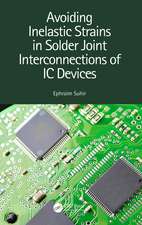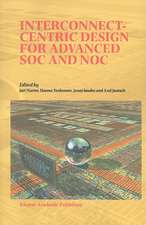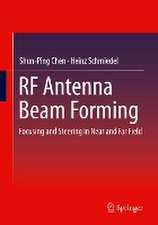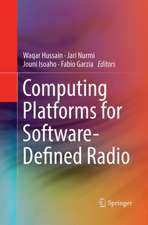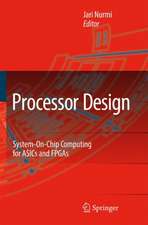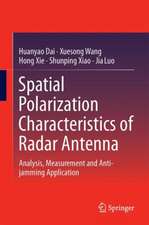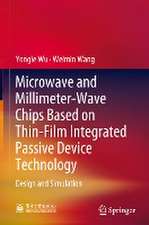GALILEO Positioning Technology: Signals and Communication Technology, cartea 182
Editat de Jari Nurmi, Elena Simona Lohan, Stephan Sand, Heikki Hurskainenen Limba Engleză Hardback – 25 sep 2014
| Toate formatele și edițiile | Preț | Express |
|---|---|---|
| Paperback (1) | 646.43 lei 6-8 săpt. | |
| SPRINGER NETHERLANDS – 11 sep 2016 | 646.43 lei 6-8 săpt. | |
| Hardback (1) | 652.81 lei 6-8 săpt. | |
| SPRINGER NETHERLANDS – 25 sep 2014 | 652.81 lei 6-8 săpt. |
Din seria Signals and Communication Technology
- 18%
 Preț: 952.89 lei
Preț: 952.89 lei - 18%
 Preț: 1559.80 lei
Preț: 1559.80 lei - 17%
 Preț: 361.80 lei
Preț: 361.80 lei - 18%
 Preț: 811.61 lei
Preț: 811.61 lei - 15%
 Preț: 585.26 lei
Preț: 585.26 lei - 18%
 Preț: 727.97 lei
Preț: 727.97 lei - 15%
 Preț: 585.90 lei
Preț: 585.90 lei -
 Preț: 393.35 lei
Preț: 393.35 lei - 20%
 Preț: 1002.72 lei
Preț: 1002.72 lei - 15%
 Preț: 641.71 lei
Preț: 641.71 lei - 20%
 Preț: 338.91 lei
Preț: 338.91 lei - 18%
 Preț: 1579.66 lei
Preț: 1579.66 lei - 18%
 Preț: 896.08 lei
Preț: 896.08 lei - 18%
 Preț: 847.11 lei
Preț: 847.11 lei - 18%
 Preț: 1234.77 lei
Preț: 1234.77 lei - 18%
 Preț: 905.54 lei
Preț: 905.54 lei - 15%
 Preț: 646.43 lei
Preț: 646.43 lei - 20%
 Preț: 662.48 lei
Preț: 662.48 lei - 15%
 Preț: 641.20 lei
Preț: 641.20 lei - 18%
 Preț: 1847.84 lei
Preț: 1847.84 lei - 18%
 Preț: 946.24 lei
Preț: 946.24 lei - 18%
 Preț: 1241.10 lei
Preț: 1241.10 lei - 20%
 Preț: 649.43 lei
Preț: 649.43 lei - 20%
 Preț: 993.28 lei
Preț: 993.28 lei - 18%
 Preț: 940.57 lei
Preț: 940.57 lei - 18%
 Preț: 1389.30 lei
Preț: 1389.30 lei - 20%
 Preț: 1003.50 lei
Preț: 1003.50 lei - 18%
 Preț: 953.52 lei
Preț: 953.52 lei - 20%
 Preț: 1001.16 lei
Preț: 1001.16 lei - 18%
 Preț: 1415.36 lei
Preț: 1415.36 lei - 15%
 Preț: 653.33 lei
Preț: 653.33 lei - 15%
 Preț: 645.60 lei
Preț: 645.60 lei - 15%
 Preț: 637.28 lei
Preț: 637.28 lei - 18%
 Preț: 948.79 lei
Preț: 948.79 lei - 18%
 Preț: 945.62 lei
Preț: 945.62 lei - 18%
 Preț: 836.36 lei
Preț: 836.36 lei - 18%
 Preț: 1225.46 lei
Preț: 1225.46 lei - 15%
 Preț: 635.01 lei
Preț: 635.01 lei - 15%
 Preț: 639.25 lei
Preț: 639.25 lei - 15%
 Preț: 646.30 lei
Preț: 646.30 lei - 15%
 Preț: 639.25 lei
Preț: 639.25 lei - 15%
 Preț: 712.36 lei
Preț: 712.36 lei - 20%
 Preț: 1006.12 lei
Preț: 1006.12 lei - 18%
 Preț: 970.56 lei
Preț: 970.56 lei
Preț: 652.81 lei
Preț vechi: 768.01 lei
-15% Nou
Puncte Express: 979
Preț estimativ în valută:
124.91€ • 130.42$ • 103.38£
124.91€ • 130.42$ • 103.38£
Carte tipărită la comandă
Livrare economică 05-19 aprilie
Preluare comenzi: 021 569.72.76
Specificații
ISBN-13: 9789400718296
ISBN-10: 9400718292
Pagini: 420
Ilustrații: XIII, 402 p. 180 illus., 107 illus. in color.
Dimensiuni: 155 x 235 x 29 mm
Greutate: 0.76 kg
Ediția:2015
Editura: SPRINGER NETHERLANDS
Colecția Springer
Seria Signals and Communication Technology
Locul publicării:Dordrecht, Netherlands
ISBN-10: 9400718292
Pagini: 420
Ilustrații: XIII, 402 p. 180 illus., 107 illus. in color.
Dimensiuni: 155 x 235 x 29 mm
Greutate: 0.76 kg
Ediția:2015
Editura: SPRINGER NETHERLANDS
Colecția Springer
Seria Signals and Communication Technology
Locul publicării:Dordrecht, Netherlands
Public țintă
ResearchCuprins
Part 1: Introductory Notions.- Introduction.- Overview of Galileo Systems.- Galileo Signals.- Part 2: Receiver, the core Galileo Positioning Technology.- Advanced RF Front-End Design Issues.- Advanced acquisition and tracking alogrithsms.- Baseband hardware implementations for Galileo receiver.- PVT Computation Issues in Mixed Galileo/GPS Reception.- Hybridization with Localization Information from Wireless Communications Systems.- Putting It All Together: TUTGNSS Receiver Platform.- Fully software Implementations for GALILEO Receiver.
Textul de pe ultima copertă
This book covers multi-band Galileo receivers (especially E1-E5 bands of Galileo) and addresses all receiver building blocks, from the antenna and front end, through details of the baseband receiver processing blocks, up to the navigation processing, including the Galileo message structure and Position, Velocity, Time (PVT) computation. Moreover, hybridization solutions with communications systems for improved localization are discussed and an open-source GNSS receiver platform (available for download) developed at Tampere University of Technology (TUT) is addressed in detail.
• Takes a holistic approach to GALILEO and related systems, such as EGNOS and hybrid solutions on mobile phones;
• Provides an invaluable reference to Binary Offset Carrier modulations and related families, which are some of the trademarks of GALILEO;
• Includes a detailed survey of GALILEO receiver research in Europe and existing software-defined radio (SDR) GALILEO receiver implementations;
• Addresses the multiple challenges in acquisition and tracking of GALILEO signals, including multipaths, ambiguities, and low carrier-to-noise ratios;
• Offers insight into the design of a Software Defined GALILEO receiver;
• Enables readers to have a full image of the processing steps involved in a GALILEO receiver.
• Takes a holistic approach to GALILEO and related systems, such as EGNOS and hybrid solutions on mobile phones;
• Provides an invaluable reference to Binary Offset Carrier modulations and related families, which are some of the trademarks of GALILEO;
• Includes a detailed survey of GALILEO receiver research in Europe and existing software-defined radio (SDR) GALILEO receiver implementations;
• Addresses the multiple challenges in acquisition and tracking of GALILEO signals, including multipaths, ambiguities, and low carrier-to-noise ratios;
• Offers insight into the design of a Software Defined GALILEO receiver;
• Enables readers to have a full image of the processing steps involved in a GALILEO receiver.
Caracteristici
Takes a holistic approach to GALILEO and related systems, such as EGNOS and hybrid solutions on mobile phones Provides an invaluable reference to Binary Offset Carrier modulations and related families, which are some of the trademarks of GALILEO; Includes a detailed survey of GALILEO receiver research in Europe and existing software-defined radio (SDR) GALILEO receiver implementations Addresses the multiple challenges in acquisition and tracking of GALILEO signals, including multipaths, ambiguities, and low carrier-to-noise ratios Offers insight into the design of a Software Defined GALILEO receiver Enables readers to have a full image of the processing steps involved in a GALILEO receiver Includes supplementary material: sn.pub/extras








